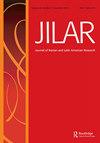Introduction Part One: A Brief History of Latin American Studies in Australia
IF 0.3
0 HUMANITIES, MULTIDISCIPLINARY
Journal of Iberian and Latin American Research
Pub Date : 2021-01-02
DOI:10.1080/13260219.2021.1978449
引用次数: 0
Abstract
In December 2016, the Institute of Latin American Studies (ILAS), a research and teaching center of Melbourne’s La Trobe University (LTU), celebrated its fortieth anniversary with a three-day conference, hosting keynote speakers from Brazil, Cuba, Peru and UK with over 70 presentations from diverse disciplines and hundreds of attendees. This event marked the 1976 inauguration of ILAS and celebrated its distinguished achievement as the oldest continually operating academic institute dedicated to Latin American research and teaching in Australia, and indeed throughout Australasia. For nearly 45 years now, ILAS has played a significant role in the formation of many Australian Latin American scholars, and has provided these researchers with a home base from which to work. The history of ILAS is, therefore, also closely linked to the history of Latin American Studies in Australia. During the late 1960s, Australia was experiencing an era of great expansion within the university sector. This period, often referred to as the golden age for universities, occurred between the twilight of the Menzies era and the demise of Gough Whitlam. It was at this time that La Trobe University was established as Victoria’s third university in 1967. From the very beginning, the study of Latin America and the teaching of Spanish were important elements of La Trobe University’s overall plan for research and pedagogy. Historian Tony Disney joined LTU in November 1969 and as he recalls, “it was a widely held assumption that La Trobe ought to become a center—in fact the center—for Latin American Studies.” This was not as a result of any outside pressure from Latin American lobbying, “but rather, sprang from the vision and persistence of a handful of enlightened amateurs.” It was thanks largely to the impetus and foresight of two such supposed amateurs, Jean Martin and Alan Martin, along with Wally Thompson, that La Trobe became a center for Latin American Studies (LAS). Jean Martin was the foundation Professor of Sociology at La Trobe University (1965–1974), while Alan Martin was appointed as the foundation Professor for History in 1966. While neither Jean or Alan were themselves Latin Americanists, both had a keen interest in Latin America, and both were well aware that no other Australian academic institution had ever taken a serious interest in the field of LAS. Jean and Alan Martin felt strongly that the new La Trobe University should fulfill that role. As a result of this belief and their positions, they actively promoted the appointment of Latin Americanists within their respective departments. Thus, scholars were appointed in the fields of History, Sociology, Spanish and Portuguese Languages引言第一部分:澳大利亚拉丁美洲研究简史
2016年12月,墨尔本拉筹伯大学(LTU)的研究和教学中心拉丁美洲研究所(ILAS)举行了为期三天的会议,庆祝成立四十周年,来自巴西、古巴、秘鲁和英国的主旨发言人出席了会议,来自不同学科的70多场演讲和数百名与会者出席了会议。这一活动标志着1976年国际拉丁美洲研究所的成立,并庆祝其作为澳大利亚乃至整个澳大拉西亚历史最悠久的致力于拉丁美洲研究和教学的持续运营的学术机构所取得的杰出成就。近45年来,ILAS在许多澳大利亚拉丁美洲学者的形成中发挥了重要作用,并为这些研究人员提供了工作的基地。因此,ILAS的历史也与澳大利亚的拉丁美洲研究史密切相关。在20世纪60年代末,澳大利亚正经历着一个大学部门大规模扩张的时代。这一时期通常被称为大学的黄金时代,发生在孟席斯时代的黄昏和高夫·惠特拉姆的灭亡之间。正是在这个时候,拉筹伯大学于1967年成立,成为维多利亚州的第三所大学。从一开始,拉丁美洲研究和西班牙语教学就是拉筹伯大学研究和教育学总体计划的重要组成部分。历史学家托尼·迪士尼于1969年11月加入LTU,正如他回忆的那样,“人们普遍认为拉筹伯应该成为拉丁美洲研究的中心——事实上是中心。”这不是拉丁美洲游说的任何外部压力的结果,“而是源于少数开明的业余爱好者的远见和毅力。“拉筹伯之所以成为拉丁美洲研究中心,很大程度上要归功于两位所谓的业余爱好者,让·马丁和艾伦·马丁,以及沃利·汤普森的推动和远见。让·马丁是拉筹伯大学社会学基础教授(1965–1974),而艾伦·马丁则于1966年被任命为历史基础教授。虽然Jean和Alan本身都不是拉丁美洲主义者,但他们都对拉丁美洲有着浓厚的兴趣,而且都很清楚,没有其他澳大利亚学术机构对LAS领域有过浓厚的兴趣。Jean和Alan Martin强烈认为新的拉筹伯大学应该履行这一职责。由于这种信念和他们的立场,他们积极推动在各自部门内任命拉丁美洲人。因此,任命了历史、社会学、西班牙语和葡萄牙语等领域的学者
本文章由计算机程序翻译,如有差异,请以英文原文为准。
求助全文
约1分钟内获得全文
求助全文
来源期刊

Journal of Iberian and Latin American Research
HUMANITIES, MULTIDISCIPLINARY-
CiteScore
0.60
自引率
0.00%
发文量
22
 求助内容:
求助内容: 应助结果提醒方式:
应助结果提醒方式:


